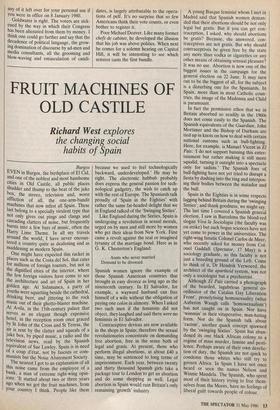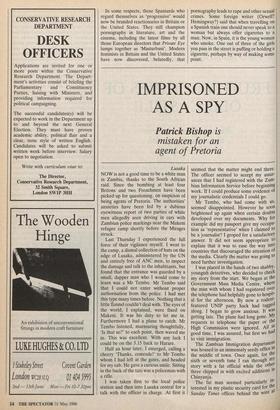FRUIT MACHINES OF OLD CASTILE
Richard West explores
the changing social habits of Spain
Burgos EVEN in Burgos, the birthplace of El Cid, and one of the noblest and most handsome cities in Old Castile, all public places shudder and thump to the beat of the juke box, the stereo, television and, worst affliction of all, the one-arm-bandit machines that now infest all Spain. These last belong to a specially virulent type that not only gives out pings and clangs and cascading clatters of noise, but frequently bursts into a few bars of music, often the Harry Lime Theme. In all my travels around the world, I have never encoun- tered a country quite as deafening and as maddening as modern Spain. One might have expected this racket in places such as the Costa del Sol, that cater for millions of foreign tourists, but not in the dignified cities of the interior, where the few foreign visitors have come to see the architecture and art of Spain in her golden age. At Salamanca, a party of youths were squatting beside the cathedral, drinking beer, and jittering to the rock music out of their ghetto-blaster machine. At Avila, in the 15th-century palace that serves as an elegant though expensive hotel, in the reception room once graced by St John of the Cross and St Teresa, the air is rent by the clatter and squeals of a juke box, by piped music, a radio and the television news, read by the Spanish equivalent of Sue Lawley. Spain is in need of a coup d'etat, not by fascists or com- munists but the Noise Abatement Society.
The nearest I got to an explanation of all this noise came from the employee of a bank, a man of extreme right-wing opin- ions: 'It started about two or three years ago when we got the fruit machines, from your country I think. People like them because we used to feel technologically backward, underdeveloped.' He may be right. The electronic hubbub probably does express the general passion for tech- nological gadgetry, the wish to catch up with the rest of Europe. The Spaniards talk proudly of 'Spain in the Eighties' with rather the same fat-headed delight that we in England talked of the 'Swinging Sixties'. Like England during the Sixties, Spain is undergoing a revolution in sexual morals, urged on by men and still more by women who get their ideas from New York. First came a revolt against the real or imagined tyranny of the marriage bond. Here as in G. K. Chesterton's England: . . . Aunts who never married Demand to be divorced.
Spanish women ignore the example of those Spanish American countries that brought in easy divorce as long ago as the nineteenth century. In El Salvador, for example, a wayward husband can free himself of a wife without the obligation of paying one colon in alimony. When I asked two such men if the feminists did not object, they laughed and said there were no feminists in El Salvador.
Contraceptive devices are now available in the shops in Spain; therefore the sexual revolutionaries concentrate on demanding free abortion, free in the sense both of legal and gratis. At present, those who perform illegal abortions, at about £40 a time, may be sentenced to long terms of imprisonment. Each year, between twenty and thirty thousand Spanish girls take a package tour to London to get an abortion and do some shopping as well. Legal abortion in Spain would ruin Britain's only remaining 'growth' industry. A young Basque feminist whom I met in Madrid said that Spanish women deman- ded that their abortions should be not only legal but gratis. But if you can get con- traception, I asked, why should abortions be gratis? Because, she answered, con- traceptives are not gratis. But why should contraceptives be given free by the state any more than vodka or cigarettes or any other means of obtaining sensual pleasure? It was no use. Abortion is now one of the biggest issues in the campaign for the general election on 22 June. It may turn out to be the biggest of all, for the subject is a disturbing one for the Spaniards. In Spain, more than in most Catholic coun- tries, the image of the Madonna and Child is paramount.
In fact the permissive ethos that we in Britain absorbed so readily in the 1960s does not come easily to the Spanish. The Spanish equivalents of the Guardian, John Mortimer and the Bishop of Durham are tied up in knots on how to deal with certain national customs such as bull-fighting. Here, for example, is Manuel Vicent in El Pais: 'I do not support banning this enter- tainment but rather making it still more squalid, turning it outright into a spectacle only for sadists.' The Spanish foes of bull-fighting have not yet tried to disrupt a fiesta by dashing into the ring and interpos- ing their bodies between the matador and the bull.
Spain in the Eighties is in some respects lagging behind Britain during the 'swinging Sixties'; and thank goodness, we might say. The last time I covered a Spanish general election, I saw in Barcelona the blood-red slogan Viva la Sociologia (the faculty was on strike) but such bogus sciences have not yet come to power in the universities. The right-wing fanatic Colonel Carlos de Meer, who recently asked for money from Col- onel Gaddafi (Spectator, 17 May) is a sociology graduate, so this faculty is not just a breeding ground of the Left. Come to think of it, Dr Hendrik Verwoerd, the architect of the apartheid system, was not only a sociologist but a psychiatrist.
Although El Pais carried a photograph of the bearded, lugubrious 'general co- ordinator of the Catalan Gay Liberation Front', proselytising homosexuality (what Auberon Waugh calls `homosexualism') has not caught on in Spain. Nor have `wimmin' in their vituperative, man-hating form. Nor do the Spanish talk about `racism', another quack concept spawned by the 'swinging Sixties'. Spain has aban- doned its one black African colony to a regime of mass murder, famine and pesti- lence. Perhaps aware of their own derelic- tion of duty, the Spanish are not quick to condemn those whites who still try to govern Africa. In Spain I have not once heard or seen the names Nelson and Winnie Mandela. The Spaniih, who spent most of their history trying to free them- selves from the Moors, have no feelings of liberal guilt towards people of colour. In some respects, those Spaniards who regard themselves as 'progressive' would now be branded reactionaries in Britain or the United States. They still champion pornography in literature, art and the cinema, including the latest films by all those European directors that Private Eye lumps together as `Masturbani'. Modern feminists in Britain and the United States have now discovered, belatedly, that pornography leads to rape and other sexual crimes. Some foreign writer (Orwell? Hemingway?) said that when travelling on a Spanish train one should never speak to a woman but always offer cigarettes to man. Now, in Spain, it is the young women who smoke. One out of three of the girls you pass in the street is puffing or holding a cigarette, perhaps by way of making some point.



























































 Previous page
Previous page